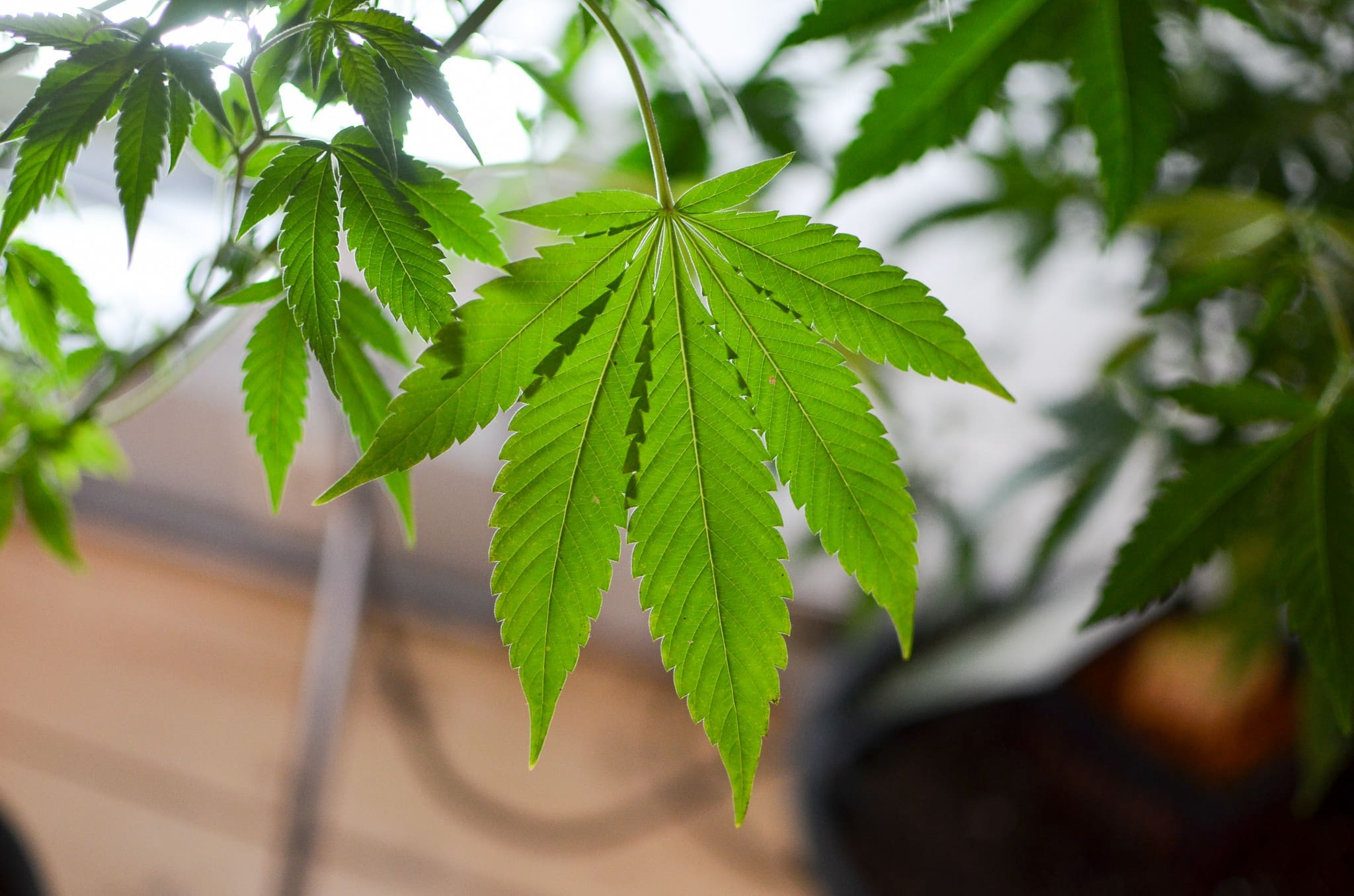Politics
Virginia GOP Governor Vetoes Marijuana Sales Legalization Bill, Along With Separate Measure To Resentence Prior Cannabis Convictions

After sending messages for months that he had no interest in moving forward with Democratic-led plans to legalize retail marijuana sales in Virginia, Gov. Glenn Youngkin (R) has now formally vetoed legal sales legislation sent to him by lawmakers about a month ago along with a separate bill to provide resentencing relief for people convicted of past cannabis crimes.
In a veto message issued on Thursday, the governor wrote that “the proposed legalization of retail marijuana in the Commonwealth endangers Virginians’ health and safety.”
“States following this path have seen adverse effects on children’s and adolescent’s health and safety, increased gang activity and violent crime, significant deterioration in mental health, decreased road safety, and significant costs associated with retail marijuana that far exceed tax revenue,” he claimed. “It also does not eliminate the illegal black-market sale of cannabis, nor guarantee product safety. Addressing the inconsistencies in enforcement and regulation in Virginia’s current laws does not justify expanding access to cannabis, following the failed paths of other states and endangering Virginians’ health and safety.”
Regarding the resentencing bill, the governor wrote: “This bill grants eligibility to a significant number of violent felons who have already received a full and fair hearing.” Other eligible individuals, he said, would include people incarcerated for other manufacturing or distributing other drugs, including fentanyl.
“Now is not the time to allow an imprudent resentencing process that undermines public safety,” Youngkin said.
If the resentencing bill had become law, many marijuana-related criminal cases would have needed to be resentenced by the end of the year. People whose sentences for other crimes were enhanced because of a prior marijuana conviction, meanwhile, would receive hearings by April 1, 2025.
As for legal sales, even before the legislative session kicked off this year, some supporters predicted Youngkin would veto any retail marijuana measure that arrived on his desk on principle, regardless of what provisions it contained. Others believed it was possible to craft a broadly appealing bill that could either win the governor’s approval or secure enough bipartisan support to overcome a potential veto.
Ultimately, however, votes for the legislation fell mostly along party lines, suggesting that Youngkin’s veto will likely stand because there isn’t enough support to override him in the Senate or House of Delegates.
Use, possession and limited cultivation of cannabis by adults is already legal in Virginia, the result of a Democrat-led proposal approved by lawmakers in 2021. But Republicans, after winning control of the House and governor’s office later that year, subsequently blocked the required reenactment of a regulatory framework for retail sales. Since then, illicit stores have sprung up to meet consumer demand.
Hope was high among supporters last year that Democrats retaking control of both chambers of the state legislature would breathe new life into the retail sales legalization effort. But despite the party’s victories in November, the bill still faced an obstacle in Youngkin.
🚨 Gov. Glenn Youngkin vetoed legislation that would have created a retail marijuana market in Virginia.
“Cannabis is bad for Virginia,” Youngkin told me @7NewsDC pic.twitter.com/wI8WwvoJl3
— Nick Minock (@NickMinock) March 28, 2024
The governor wrote in his 4-page veto message Thursday: “Attempting to rectify the error of decriminalizing marijuana by establishing a safe and regulated marketplace is an unachievable goal. The more prudent approach would be to revisit the issue of discrepancies in enforcement, not compounding the risks and endangering Virginians’ health and safety with greater market availability.”
The bill’s lead sponsors, Del. Paul Krizek (D) and Sen. Aaron Rouse (D), said in a press release that the governor’s veto was “dangerous and irresponsible” as well as “reckless and negligent.”
“Governor Youngkin’s dismissive stance towards addressing Virginia’s cannabis sales dilemma is unacceptable,” Rouse said. “Public servants are obligated to tackle pressing issues, regardless of their origin or culpability. They cannot cherry-pick which problems to address.”
Krizek said in the statement that the governor’s “failure to act allows an already thriving illegal cannabis market to persist, fueling criminal activity and endangering our communities.”
“This veto squandered a vital opportunity to safeguard Virginians,” he said, “and will only exacerbate the proliferation of illicit products, posing greater risks to our schools and public safety.”
In a separate email to Marijuana Moment, Krizek said that despite the veto, the bill passed by the legislature still marked progress for Virginia. And he signaled he’d again support the reform next session.
“We really did craft a wonderful piece of bicameral legislation that even garnered bipartisan support, albeit not as many members as I would have expected, but that was probably due to Governor’s antipathy toward it,” he said. “So, we have a bill we can introduce next session that will only need some minor adjustments (I did see some small improvements we can make) and gives us a head start.”
Gov. Youngkin’s dismissive stance towards addressing Virginia’s cannabis sales dilemma is unacceptable. Public servants are obligated to tackle pressing issues. This legislation would have combated the illegal market & ensured access to safe, tested and taxed cannabis products.
— Aaron Rouse (@AaronRouseVaBch) March 28, 2024
Legalization advocates in the commonwealth greeted the sales measure veto with disappointment but also vowed to continue working to enact the reform.
“Governor Youngkin has just shown Virginians exactly how out of touch he is with the widely-accepted science and policy research on cannabis in the US,” JM Pedini, NORML’s development director and executive director for Virginia NORML, told Marijuana Moment in an emailed statement.
“Virginians deserve better than this head-in-the-sand approach to lawmaking from their elected officials,” they said. “The only protection Youngkin’s veto provides is to the illicit market that has ballooned during his time office.”
Jason Blanchette, president of the Virginia Cannabis Association, said that Youngkin clearly “has no regard for the position of over 60 percent of his constituents in this state.”
“This is an issue that has bipartisan support across the state from the people that put the elected officials to represent them into office. This is a classic case, yet again, where the people have little to no actual representation,” he told Marijuana Moment. “It is a shame that this outcome has been distilled down to a partisan fight between the Governor and the General Assembly and the ones that are affected by it are all of the constituents.”
Chelsea Higgs Wise, executive director of the group Marijuana Justice, said the veto “has caused the delay of tens of thousands of jobs, tax revenue, and other opportunities a regulated cannabis market provides.”
“This bill would have addressed the intergenerational harms cannabis prohibition has brought to our communities by reinvesting 60 percent of tax revenue back into those communities,” told Marijuana Moment. “We will be back next year to ensure Virginia’s cannabis market is just and we welcome all to get involved and participate.”
Gov Younkin’s commitment to perpetuating the harms of the drug is deeply embarrassing. With the stroke of a pen he has reinforced yet another barrier for Virginians. This doesn’t just impact individuals, it reverberates through families, education & housing.
We deserve better!
— Chelsea Higgs Wise (@ChelseaWiseRVA) March 28, 2024
With his veto of the resentencing bill, Wise added, Youngkin “is continuing a legacy of injustice by allowing people with past marijuana offenses to remain in prison, jail and probation even though with convictions that are now decriminalized.”
“Even without a regulated market, we should be able to legislate reasonably for people serving time for what is now a legal substance,” she said.
Ahead of the veto, the governor had hinted at his intentions. About a week earlier, Youngkin told a reporter: “Anybody who thinks I’m going to sign that legislation must be smoking something.”
Some had higher hopes for Youngkin when he was first elected in 2021.
“With Governor-elect Youngkin previously stating that he would uphold the will of the people, and focus on creating a ‘rip-roaring economy,’ we are fully confident that he and the people of Virginia will continue to make progress,” Jim Cacioppo, the CEO, chairman and founder of multistate cannabis company Jushi Holdings, said in a statement at the time.
In an email to Marijuana Moment after the veto, however, Jushi’s chief strategy director, Trent Woloveck, described Youngkin as “a sanctimonious culture warrior.”
“His reasons for vetoing and the mischaracterization of the facts continue to illustrate his unwillingness to understand the everyday lives and needs of his constituents and his favor for a select few,” Woloveck wrote. “His push to be a sanctimonious culture warrior shows through time and time again as he prepares to seek higher office in the future. This industry will continue to push forward and be on the right side of history in the commonwealth long after the governor’s legacy has gone up in smoke.”
The governor this session has also greeted less controversial marijuana reforms coldly. Earlier this month, for example, he vetoed a separate proposal that would have prevented the state from using marijuana alone as evidence of child abuse or neglect despite the measure winning unanimous or near-unanimous approval in votes on the Senate floor.
Following that action, Del. Rae Cousins (D), the bill’s sponsor, accused the governor of “turning his back on the needs of our children and neglecting their well-being by encouraging the courts to move forward with unnecessary family separations.”
“We have seen how this is playing out in our courts; with Black and Brown families receiving harsher mandates from our judges for legal and responsible substance use,” the lawmaker said. “Family separation has devastating effects both on our communities and on the well-being of children, and by vetoing this legislation, Governor Youngkin is telling our courts that they can continue to unnecessarily tear children away from their parents.”
In January, at the time of his State of the Commonwealth address, the governor said he didn’t have “any interest” in moving forward with the Democrat-led cannabis plans. Late last month, his press secretary reiterated those comments in a message to Marijuana Moment.
“I would refer you back to the Governor’s comments during the gaggle after the State of the Commonwealth,” Christian Martinez said in an email, “where he said he doesn’t have a lot of interest in pressing forward with marijuana legalization.”
At one point earlier this session, however, it appeared the retail cannabis bill could become part of a grand deal between Youngkin and legislative Democrats. In December, Senate President Pro Tempore Louise Lucas (D) alluded to a compromise involving a sports stadium project the governor supported. But that deal never materialized, and Democrats left the governor’s proposed arena plan out of budget legislation. This week, the little remaining hope for the stadium deal fell through.
One day before his cannabis veto, Youngkin said in a statement that the stadium project had “gone up in smoke” after the city of Alexandria halted negotiations around the proposal—a possible nod to the would-be deal’s implications for his support of the marijuana measure.
Krizek had previously used the same phrase around his hopes that Youngkin would sign the legalization bill. “As those great philosophers Tommy Chong and Cheech Marin would say, ‘It’s up in smoke,’” he said earlier this month.
Supporters of the sales bill, including sponsors in both the House and Senate, have repeatedly said the bill would not create a cannabis market in Virginia but instead regulate the state’s existing illicit market, which some estimates have valued at nearly $3 billion.
The legislation sent to Youngkin would have begun licensing marijuana businesses later this year, with sales slated to kick off on May 1, 2025. Sales to adults 21 and older of up to 2.5 ounces of marijuana flower would be allowed, with purchases taxed at 11.625 percent. Local governments could ban marijuana establishments, but only with the support of local voters.
Here’s what Virginia’s lawmaker-passed retail sales legislation would have done:
- Retail sales could begin as of May 1, 2025.
- Adults would be able to purchase up to 2.5 ounces of marijuana in a single transaction, or up to an equivalent amount of other cannabis products as determined by regulators.
- A state tax of 11.625 percent would apply to the retail sale of any cannabis product. Of that, 8 percent would go to the state, local governments would get 2.5 percent and 1.125 percent would fund schools.
- The Virginia Cannabis Control Authority would oversee licensing and regulation of the new industry. Its board of directors would have the authority to control possession, sale, transportation, distribution, delivery and testing of marijuana.
- Local governments could ban marijuana establishments, but only if voters first approve an opt-out referendum.
- Locations of retail outlets could not be within 1,000 feet of another marijuana retailer.
- Cultivators would be regulated by space devoted to marijuana cultivation, known as canopy size. Both indoor and outdoor marijuana cultivation would be allowed, though only growers in lower tiers—with lower limits on canopy size—could grow plants outside. Larger growers would need to cultivate plants indoors. Secure greenhouses would qualify as indoor cultivation.
- Only direct, face-to-face transactions would be permitted. The legislation would prohibit the use of other avenues, such as vending machines, drive-through windows, internet-based sales platforms and delivery services.
- Existing medical marijuana providers that enter the adult-use market could apply to open up to five additional retail establishments, which would need to be colocated at their existing licensed facilities.
- Serving sizes would be capped at 10 milligrams THC, with no more than 100 mg THC per package.
- No person could be granted or hold an interest in more than five total licenses, not including transporter licenses.
- People with convictions for felonies or crimes involving moral turpitude within the past seven years would be ineligible to apply for licensing, as would employees of police or sheriff’s departments if they’re responsible for enforcement of the penal, traffic or motor vehicle laws of the commonwealth.
- An equity-focused microbusiness program would grant licenses to entities at least two-thirds owned and directly controlled by eligible applicants, which include people with past cannabis misdemeanors, family members of people with past convictions, military veterans, individuals who’ve lived at least three of the past five years in a “historically economically disadvantaged community,” people who’ve attended schools in those areas and individuals who received a federal Pell grant or attended a college or university where at least 30 percent of students are eligible for Pell grants.
- “Historically economically disadvantaged community” is an area that has recorded marijuana possession offenses at or above 150 percent of the statewide average between 2009 and 2019.
- Tax revenue from the program would first cover the costs of administering and enforcing the state’s cannabis system. After that, 60 percent of remaining funds would go toward supporting the state’s Cannabis Equity Reinvestment Fund, 25 percent would fund substance use disorder treatment and prevention, 10 percent would go to pre-K programs for at-risk children and 5 percent would fund a public health and awareness campaign.
- Adults could also share up to 2.5 ounces with other adults without financial remuneration, though gray-market “gifting” of marijuana as part of another transaction would be punishable as a Class 2 misdemeanor and a Class 1 misdemeanor on second and subsequent offenses.
- A number of other new criminal penalties would be created. Knowingly selling or giving marijuana or marijuana paraphernalia to someone under 21, for example, would be a Class 1 misdemeanor, punishable by up to a year in jail and a maximum $2,500 fine, as would knowingly selling cannabis to someone reasonably believed to be intoxicated. It would also be a Class 1 misdemeanor to advertise the sale of marijuana paraphernalia to people under 21.
- Knowingly obtaining marijuana on behalf of someone under 21 would be a Class 1 misdemeanor.
- People under 21 who possess or use marijuana, or attempt to obtain it, would be subject to a civil penalty of no more than $25 and ordered to enter a substance use disorder treatment and/or education program.
- Illegal cultivation or manufacture of marijuana, not including legal homegrow, would be a Class 6 felony, punishable by up to five years imprisonment and a $2,500 fine.
- People could process homegrown marijuana into products such as edibles, but butane extraction or the use of other volatile solvents would be punishable as a Class 1 misdemeanor.
Other cannabis-related bills still before the governor include a measure to protect public sector workers from employment discrimination based on lawful medical marijuana use.
A sales bill did advance through the Democratic-controlled Senate last session, but it stalled in committee in the House, which at the time had a GOP majority.
Photo courtesy of Philip Steffan.
















